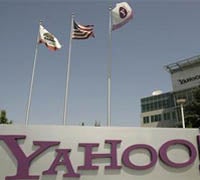 |
Source: Reuters |
Embattled Web pioneer Yahoo (NASDAQ: YHOO) placed a big stack of chips behind its future as a display advertising platform today, offering details of a string of new ad partnerships that it hopes will be enough to convince investors that the company’s turnaround strategy is working.
Speaking this morning at an advertising conference in New York, Yahoo President Sue Decker laid out a vision of Yahoo taking a position at the nexus of online advertising.
“Yahoo is helping to accelerate the transformation of how display advertising is both bought and sold,” Decker said. She described how Yahoo’s role as a technology provider meshes with the deals it is pursuing with buyers and sellers of online display ads.
For the past four months, Yahoo has been among the most scrutinized companies in the tech industry. Since talks with Microsoft (NASDAQ: MSFT) over its offer to buy the company broke down, Yahoo has been under fire from many shareholders angry with its board of directors for turning down a higher valuation than they felt it could achieve on its own.
One of those investors, Carl Icahn, has announced his intention to unseat the company’s board at its annual shareholder meeting, which Yahoo said yesterday it had rescheduled for Aug. 1.
If Icahn proceeds with his proxy war, that meeting will be a referendum on Yahoo’s management and investors’ confidence in its ability to reposition the company as a viable ad-driven Web property in the long shadow of Google (NASDAQ: GOOG). On Tuesday, The Wall Street Journal quoted Icahn as saying that he would seek to dismiss Jerry Yang as CEO if he won control of the board.
With the deals announced today, Yahoo forged deeper connections with companies spread across the online advertising value chain.
Yahoo has signed with Wal-Mart (NYSE: WMT) to manage display and video advertising for the world’s largest retailer, which will gain access to Yahoo’s network of advertisers. It also becomes the exclusive portal to resell display inventory on Walmart.com.
On the agency side, Yahoo has teamed with Havas Digital to develop a proprietary media-trading platform to connect publishers with advertisers. Havas also plans to adopt Yahoo’s forthcoming ad management platform aimed at simplifying online ad buying and selling.
New content agreements
With CBS (NYSE: CBS), the new deal is more about content syndication. Yahoo is expanding its existing relationship with the broadcaster to host and stream CBS content through the Yahoo TV property in an ad-supported model. Yahoo’s site has already been featuring local news from some CBS affiliates and special features from 60 Minutes.
Broadening the distribution of its online content is consistent with CBS’ recent efforts to warm up to the Web. Just last month, CBS announced that it was buying CNET Networks (NASDAQ: CNET), the popular Internet network, in an attempt to expand its online presence.
Yahoo also came out with some healthy signs about its work with the newspaper industry. Yahoo said that 94 more newspapers have joined its Newspaper Consortium, a technology platform for newspapers to sell locally targeted ads through Yahoo’s network. That brings the total to 779 papers in the network.
Finally, Yahoo offered details about a new initiative to supplement the traditional newspaper circular with an online format. Through a partnership with the ad-placement service ShopLocal, retailers will be able to place the price-promotion offers typically found in a Sunday circular throughout Yahoo’s network, in the hopes of reaching a more targeted audience under a more flexible pricing and distribution model.
This string of announcements comes amid speculation that Yahoo might look to form an alliance with Google or Microsoft to handle some portion of its advertising activities.
For Microsoft’s part, the motivation of a Yahoo acquisition was to better compete with Google in search advertising. Today’s announcements are all centered around the more competitive segment of display advertising.
Microsoft has said that it is still talking with Yahoo about some form of partnership, likely involving either search or display advertising, but that it is no longer actively pursuing an outright acquisition.
Now, investors frustrated with Yahoo’s position will be asking themselves if that position could change should Icahn gain control of the company with his rival slate of directors and force Yang out. They’ll have 58 days to decide.


